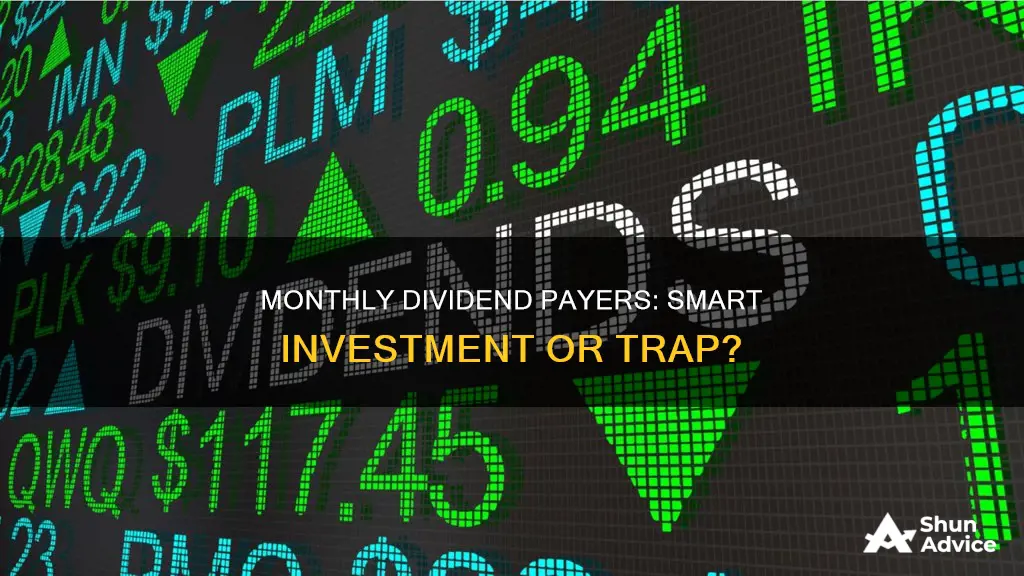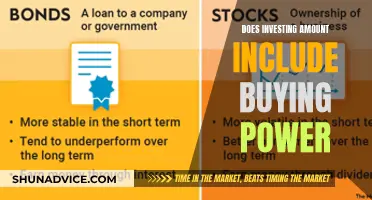
Monthly dividend stocks are a great option for investors looking for a regular income to help with monthly budgeting. These stocks are usually from sectors like real estate investment trusts (REITs) and business development companies (BDCs), and they offer yields that are much higher than the market average. While most companies pay dividends quarterly, there are around 80 stocks that pay dividends monthly, and many of them have high dividend yields of above 7%.
Monthly dividend stocks can smooth out your income stream and better align your inflows with your outgoings. They are especially useful for retirees or those on a fixed budget who rely on their stock holdings as a source of income.
Some of the top monthly dividend stocks include STAG Industrial, EPR Properties, Realty Income, and Gladstone Commercial.
| Characteristics | Values |
|---|---|
| Number of monthly dividend stocks | ~80 |
| Example of monthly dividend stocks | Realty Income, Main Street Capital, Agree Realty, STAG Industrial, RioCan, Gladstone Investment Corporation, Gladstone Land, SLR Investment Corp., Phillips Edison, EPR Properties, SL Green Realty, Apple Hospitality, PennantPark Floating Rate Capital, Gladstone Commercial, Gladstone Capital Corporation, LTC Properties, Horizon Technology, Prospect Capital, Whitestone REIT, Stellus Capital, Ellington Financial, Ellington Residential, Oxford Square Capital, Dynex Capital, AGNC, Armour Residential REIT, Orchid Island Capital, Sabine Royalty Trust, Global Water Resources, Slate Grocery REIT, BSR REIT, Maxus Realty Trust, CT REIT, Firm Capital Property Trust, Savaria, Diversified Royalty, U.S. Global Investors, Modiv, Flagship Communities REIT, Generation Income Properties, Primaris REIT, Timbercreek Financial, Fortitude Gold, Pine Cliff Energy, Paramount Resources, Alpine Summit Energy Partners, Tamarack Valley Energy |
| Example of monthly dividend ETFs | Global X SuperDividend ETF, Global X SuperDividend U.S. ETF, Invesco S&P 500 High Dividend Low Volatility ETF, WisdomTree U.S. High Dividend Fund, Invesco Preferred ETF, Invesco KBW High Dividend Yield Financial ETF, iShares Preferred and Income Securities ETF, SPDR Dow Jones Industrial Average ETF Trust |
What You'll Learn

Real Estate Investment Trusts (REITs)
REITs invest in a wide range of property types, including apartment buildings, cell towers, data centres, hotels, medical facilities, offices, retail centres, and warehouses. They can be publicly traded or private, with most trading on major stock exchanges. Publicly traded REITs are highly liquid and tend to have better governance standards and more transparency.
There are three main types of REITs: equity REITs, mortgage REITs, and hybrid REITs. Equity REITs operate like a landlord, collecting rent and managing the property. Mortgage REITs, on the other hand, don't own the underlying property but instead own debt securities backed by the property, such as mortgages. Hybrid REITs combine these strategies, owning and operating real estate properties while also holding commercial property mortgages.
REITs offer several benefits to investors. They provide stable cash flow through dividends, attractive risk-adjusted returns, and diversification to a portfolio. Additionally, REITs are easy to buy and sell, especially publicly traded REITs, which can be purchased on major stock exchanges just like stocks.
However, there are also some drawbacks to consider. REITs have a heavy debt burden due to their legal status, and they offer low growth and capital appreciation since most of their profits are paid out as dividends. REIT dividends are taxed as regular income, and some REITs have high management and transaction fees.
Overall, REITs provide a convenient way for investors to gain exposure to the real estate market and generate passive income through dividends.
Dividend-Paying ETFs: Smart Investment or Missed Opportunity?
You may want to see also

Business Development Companies (BDCs)
BDCs, similar to private equity funds, invest in small- and mid-sized companies, with a focus on the "middle market." These are typically private companies that are too big for bank financing but not large enough for an initial public offering (IPO). BDCs provide both debt and equity financing to these businesses, filling a critical gap in the capital market.
While BDCs offer high dividend yields, it is important to note that they come with certain risks. They invest in smaller and distressed companies, which can be more vulnerable to economic downturns. Additionally, BDCs themselves may have high costs due to external management structures, and their performance can be impacted by rising interest rates.
- Main Street Capital (MAIN): MAIN is considered one of the best-managed BDCs and has a strong track record of dividend payments. It offers monthly dividend payouts and has never reduced its dividend since going public in 2007. MAIN focuses on providing financing to middle-market companies with annual revenues between $10 million and $150 million. It has a diversified portfolio, investing in various sectors, including industrials, energy, information technology, and consumer discretionary.
- Hercules Capital (HTGC): Hercules Capital differentiates itself by focusing on growth-oriented, venture capital-backed companies, particularly in technology, life sciences, and renewable technology. It has been in operation since 2003 and has committed significant funding to over 570 companies, including well-known names like Facebook (Meta Platforms). HTGC has a strong track record of dividend payments and benefits from having a high proportion of floating-rate investments, which can lead to higher interest income during rising interest rates.
- Prospect Capital (PSEC): PSEC is one of the largest and oldest BDCs, providing financing to larger and more creditworthy middle-market companies. It has a diverse portfolio spread across various industries and investments. However, PSEC has historically struggled with creating shareholder value and maintaining its dividend, undergoing two large cuts over the past decade. The external management structure and riskier investment portfolio have contributed to these challenges.
- PennantPark Floating Rate Capital (PFLT): PFLT stands out for its focus on floating-rate loans and investments in less cyclical industries. It lends to somewhat smaller companies but mitigates risk by prioritizing first-lien senior secured debt, which gets priority in the event of borrower default. PFLT has a solid operational track record and a diversified portfolio. However, investors should be comfortable with the inherent cyclicality of the BDC industry.
In conclusion, Business Development Companies (BDCs) offer high dividend yields and provide a unique opportunity for investors to support emerging companies. However, it is important for investors to carefully evaluate the risks and nuances associated with BDCs before making investment decisions.
Smart Money: Where's It Going?
You may want to see also

Monthly dividend ETFs
- JPMorgan Equity Premium Income Fund: This fund has an impressive 30-day SEC yield of 6.98% and a low expense ratio of 0.35%. It includes large-cap equity and covered call options in its portfolio and has amassed $33 billion in total assets since its inception in May 2020.
- JPMorgan NASDAQ Equity Premium Income Fund (JEPQ): This fund mirrors the strategy of JEPI, using the Nasdaq-100 as the base index. It has a slightly higher expense ratio of 0.35% and was introduced in May 2022.
- Invesco S&P 500 Low Volatility ETF: This ETF tracks the S&P 500 Low Volatility Index and has the lowest yield on this list. It has an expense ratio of 0.25% and was introduced in May 2011.
- WisdomTree U.S. LargeCap Dividend Fund: This fund includes large-cap, dividend-paying stocks that are screened for quality. It has a good track record of producing yields above 2% and has an expense ratio of 0.28%.
- WisdomTree U.S. MidCap Dividend Fund: This fund uses the same methodology as the WisdomTree U.S. LargeCap Dividend Fund but focuses on mid-cap stocks. It has a slightly higher expense ratio of 0.38%.
- Invesco S&P 500 High Dividend Low Volatility ETF: This ETF tracks the S&P 500 High Dividend Low Volatility Index and has a strong dividend yield of over 4% on average over the past five years. It has an expense ratio of 0.30%.
- Global X SuperDividend ETF (SDIV): This fund tracks an index of 100 equally weighted companies with high dividend payouts and lower-than-average volatility. It has been making monthly dividend distributions for more than nine years and has an expense ratio of 0.59%.
- Global X SuperDividend U.S. ETF (DIV): This fund was established in 2013 and focuses on low-volatility, high-yielding securities. It has an expense ratio of 0.45%.
- Invesco S&P 500 High Dividend Low Volatility ETF (SPHD): This ETF has an expense ratio of 0.30% and a dividend yield of 3.53%.
- WisdomTree U.S. High Dividend Fund (DHS): This fund mimics the WisdomTree High Dividend Index and has an expense ratio of 0.38%.
- Invesco Preferred ETF (PGX): This ETF delivers high yields and has an expense ratio of 0.51%.
- Invesco KBW High Dividend Yield Financial ETF (KBWD): This fund is heavily weighted towards publicly held financial companies and has an expense ratio of 2.59%.
- IShares Preferred and Income Securities ETF (PFF): This ETF seeks to mirror the performance of the S&P U.S. Preferred Stock Index and has an expense ratio of 0.45%.
- SPDR Dow Jones Industrial Average ETF Trust (DIA): While this ETF does not offer the highest yield, it may be attractive to investors looking for capital appreciation potential. It has a low expense ratio of 0.16%.
Silver's Investment History: 1800s
You may want to see also

Monthly dividend stocks for retirees
Monthly dividend stocks are a great way for retirees to generate a recurring passive income. Here are some of the best monthly dividend stocks to consider:
Realty Income (O)
Realty Income, also known as The Monthly Dividend Company, has paid consecutive monthly dividends since its initial public offering (IPO) in 1994. With over 600 consecutive monthly dividends, Realty Income has a strong track record of increasing its dividend, with a compound annual rate of 4.3%. The company owns nearly 6,600 commercial real estate properties leased to approximately 600 tenants across 51 industries, providing very predictable cash flow.
EPR Properties
EPR Properties is a real estate investment trust (REIT) that specialises in experiential real estate, such as movie theatres, eat-and-play venues, ski resorts, and gaming facilities. After a challenging period during the COVID-19 pandemic, EPR is back on a growth trajectory as consumers return to in-person experiences. While movie theatres remain a weak spot, EPR's properties are some of the busiest and most valuable for its tenants.
Agree Realty (ADC)
Agree Realty is another REIT that focuses on freestanding retail properties leased to essential retailers, such as grocery, home improvement, and drug stores. By generating recurring rental income and having a strong tenant base, Agree Realty has been able to increase its dividend at a compound annual rate of 5.6% over the past decade. The company has a strong track record of expanding its portfolio, ensuring modest and reliable dividend growth.
Gladstone Commercial Corporation (GOOD)
Gladstone Commercial is a diversified REIT that owns net leased office and industrial properties, focusing on secondary markets for higher investment yields. While the company had to cut its dividend by 20% due to poorly performing office properties, it has stabilised its business and is acquiring high-demand industrial properties. With a yield above 8%, Gladstone offers an interesting risk-reward profile.
LTC Properties
LTC Properties is a healthcare REIT that invests primarily in senior housing and skilled nursing properties. The COVID-19 pandemic significantly impacted this sector, and LTC has been unable to increase its payout since 2016. However, with a yield of over 6%, LTC offers a stable monthly dividend and the potential for long-term growth as the senior housing sector recovers.
Other Options
In addition to the stocks mentioned above, there are other options for retirees seeking monthly dividend income. These include:
- SL Green Realty (SLG)
- STAG Industrial (STAG)
- Chevron (CVX)
- International Business Machines (IBM)
- Coca-Cola (KO)
- Johnson & Johnson (JNJ)
- Pembina Pipeline (PBA)
- Enbridge (ENB)
- Enterprise Products Partners LP (EPD)
- Gladstone Capital Corp. (GLAD)
- Cross Timbers Royalty Trust (CRT)
- PennantPark Floating Rate Capital Ltd. (PFLT)
- Dynex Capital Inc. (DX)
American Century Investments: Public Opinion
You may want to see also

Monthly dividend stocks with high yields
Monthly dividend stocks can be a great addition to your portfolio, especially if you're looking for regular income. Here are some of the top monthly dividend stocks with high yields to consider:
- STAG Industrial (STAG): With a market value of $6.5 billion and a dividend yield of 4.2%, STAG Industrial invests in logistics and light industrial properties, benefiting from the growth of e-commerce. It has Amazon as its largest tenant and is well-positioned to profit from the increasing trend of online shopping.
- EPR Properties (EPR): EPR has a market value of $3.1 billion and offers a dividend yield of 8.4%. It owns a diverse portfolio of experiential real estate, including movie theaters, amusement parks, ski resorts, and "eat-and-play" venues. The company had a challenging time during the pandemic but has since reinstated its monthly dividend and raised it annually.
- Realty Income (O): Known as "The Monthly Dividend Company," Realty Income has a market value of $46.3 billion and a dividend yield of 5.9%. It focuses on high-traffic retail properties that are often recession-proof and has a diverse range of tenants across various industries. The company has a strong track record of consecutive monthly dividend payments and increases.
- AGNC Investment Corp. (AGNC): AGNC is a unique REIT that invests in mortgage securities instead of physical properties. It has a market value of $7.1 billion and an impressive dividend yield of 14.8%. However, investors should be aware that mortgage REITs are more vulnerable to interest rate changes.
- Gladstone Commercial (GOOD): Gladstone Commercial has a market value of $556.8 million and offers a dividend yield of 8.7%. It owns a diversified portfolio of logistical and light industrial properties, as well as office and retail spaces. The company has a strong track record of consistent monthly dividend payments and maintains high occupancy rates.
- LTC Properties (LTC): LTC is a REIT focused on senior living and skilled nursing properties. With a market value of $1.5 billion and a dividend yield of 6.7%, LTC offers a high yield and the potential for long-term growth due to demographic trends. However, it faced challenges during the pandemic and continues to navigate industry headwinds.
- Dynex Capital (DX): Dynex Capital is another mortgage REIT with a market value of $893.1 million and a dividend yield of 13.0%. It primarily invests in agency residential mortgage-backed securities, providing stable income. However, investors should be cautious as mortgage REITs are sensitive to interest rate changes.
- Main Street Capital (MAIN): Main Street Capital is a business development company (BDC) with a market value of $4.2 billion and a dividend yield of 8.4%. It provides capital to middle-market companies and has a conservative dividend model, including special dividends twice a year. The company has a strong track record and is well-positioned to weather economic downturns.
When considering monthly dividend stocks, it's important to assess the risks and evaluate the financial stability of the companies. Additionally, look beyond the dividend yield and consider the overall health and growth prospects of the business.
Kickstarter: Why People Invest in Ideas
You may want to see also
Frequently asked questions
Some monthly dividend stocks to consider include EPR Properties, Agree Realty, and Realty Income.
Monthly dividend stocks can provide a stable income and make budgeting easier by providing a regular cash flow that aligns with real-world expenses.
The real estate investment trust (REIT) and business development company (BDC) sectors tend to offer a higher number of monthly dividend stocks.
It is important to assess the risk of any investment opportunity by considering factors such as the company's financial health, stability, and diversification. Due diligence is crucial before investing.
Yes, there are ETFs that offer monthly dividend payments, such as the Global X SuperDividend ETF (SDIV) and the Invesco S&P 500 High Dividend Low Volatility ETF (SPHD). However, always conduct thorough research before investing.







